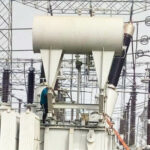Electricity consumers are expecting a new tariff decision today that will be active for the next six months barring changes by the Nigerian Electricity Regulatory Commission (NERC).
NERC had in April 2021 announced that it was reviewing the Multi Year Tariff Order (MYTO) 2021 and the Performance Improvement Plans (PIP) of the 11 Distribution Companies (DisCos).
By May, it approved the PIPs for the DisCos and is expected to approve the minor tariff review of the MYTO effective today, July 1.
Earlier in April, the Minister of Power, Engr. Sale Mamman, in a statement, confirmed that the tariff increase would be slight to maange headwinds from inflation and the rising foreign exchange.
Mamman explained that the order issued by the Nigerian Electricity Regulatory Commission (NERC) on the April 26, 2021 announcing tariff reviews, was a routine procedure for the Multi-Year Tariff Order (MYTO) done every six months.
“The tariff for customers on service bands D & E (customers being served less than an average of 12hrs of supply per day over a period of one month) remains subsidized in line with the policy direction of the federal government,” said Mamman.
Mr John Okoro, a resident of Wuse in Abuja said, already the current was huge, appealing for a break. “This band A and B or so is really high on consumers, especially those without meters, the DisCos would have to pause.”
NERC chairman Sanusi Garba had recently appeared before the National Assembly as lawmakers demanded suspension of the July 2021 tariff hike. But Garba had said the Generation Companies (GenCos) sell electricity to the DisCos at a price, and the DisCos will certainly not sell to consumers at the same price.
Garba said NERC regulates the prices to ensure that the burden of price is not transferred to consumers and they are not exploited.
As the new month begins, a senior official of NERC on Wednesday afternoon said the Commission was yet to reach a decision.
However, another official said there was no going back or else the liquidity crisis could strangle the sector as the government through the Central bank of Nigeria (CBN) currently pays N30 billion monthly in subsidy.

 Join Daily Trust WhatsApp Community For Quick Access To News and Happenings Around You.
Join Daily Trust WhatsApp Community For Quick Access To News and Happenings Around You.


